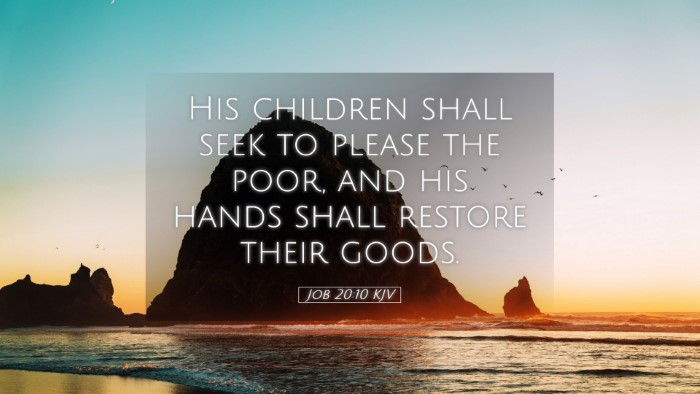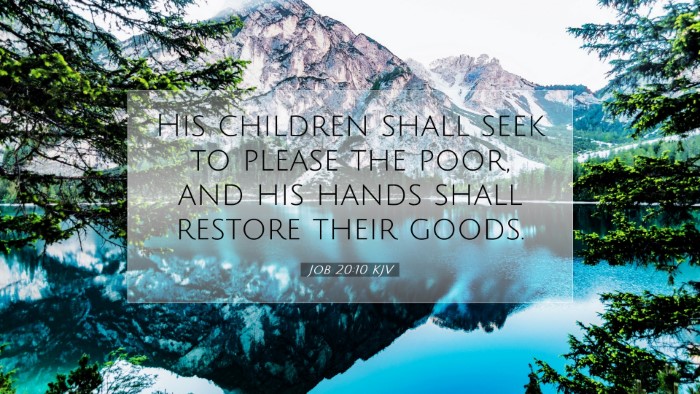Old Testament
Genesis Exodus Leviticus Numbers Deuteronomy Joshua Judges Ruth 1 Samuel 2 Samuel 1 Kings 2 Kings 1 Chronicles 2 Chronicles Ezra Nehemiah Esther Job Psalms Proverbs Ecclesiastes Song of Solomon Isaiah Jeremiah Lamentations Ezekiel Daniel Hosea Joel Amos Obadiah Jonah Micah Nahum Habakkuk Zephaniah Haggai Zechariah MalachiJob 20:10
Job 20:10 KJV
His children shall seek to please the poor, and his hands shall restore their goods.
Job 20:10 Bible Commentary
Commentary on Job 20:10
Job 20:10 states: "His children shall seek to please the poor, and his hands shall restore their goods." This verse is situated within a larger discourse on the fate of the wicked, particularly focusing on the fate of Zophar's perceived enemy—Job himself.
Contextual Overview
In the Book of Job, amidst the dialogue between Job and his friends, Zophar the Naamathite asserts that the wicked will face certain retribution. The proclamations made here reflect a broader understanding of divine justice, where the prosperity of the wicked is only temporary, leading to a downfall.
Exegesis of Job 20:10
Here, we will delve into the implications of this verse, drawing insights from noted commentators:
- Matthew Henry:
Henry reflects on the moral decay and the eventual ruin that befalls the wicked. In his exposition, he emphasizes the idea that the children of the wicked, having inherited the consequences of their father's sins, might engage in acts of charity as if to atone for their parent's misdeeds. The restoration of goods, in this context, symbolizes a return to a state of innocence.
- Albert Barnes:
Barnes interprets this verse as an indictment of the wicked man's legacy. He posits that the children of the wicked, faced with the repercussions of their father's actions, will be motivated to seek to please the poor, perhaps as a means of gaining favor with society or as a misguided attempt at rectifying their father's wrongs. This generates an essential point about the indirect consequences of one's actions on their descendants.
- Adam Clarke:
Clarke gives a more pastoral view, indicating that the verse highlights the futility of wickedness and the inevitable realization of their wrongs, which leads to corrective measures in younger generations. He notes that the restoration of goods speaks to a deeper restoration of right relationships, emphasizing the relational aspect of both justice and grace.
Thematic Insights
Job 20:10 encapsulates several important themes:
- Repercussions of Sin:
The text stresses that actions bear consequences—not only for the individual but also for their lineage. This is particularly poignant for pastoral care, reminding leaders and congregants alike of the weight of sin and its multigenerational impact.
- Divine Justice:
This verse reaffirms the belief in divine justice, suggesting that ultimately, God corrects the imbalances wrought by wickedness, often through means unexpected by humankind.
- Hope for Restoration:
Despite the judgment hinted at, there is a glimmer of hope—the idea that the children seek to restore what has been lost. This fosters a narrative of recovery and redemption, foundational to the Christian faith.
Application and Reflection
For pastors and theologians, Job 20:10 serves as a poignant reminder of the importance of nurturing righteousness within oneself and one's family. The verse can prompt significant reflection on the legacies that are left behind and the areas in which individuals today might seek to "restore their goods," either materially or relationally.
Additionally, it offers a platform for exploring themes of repentance, forgiveness, and the necessity of embracing a life of integrity in the face of adversity. The context also leads to opportunities for sermons or discussions around the responsibilities of parents towards their children and the poignant truth that, while inheritance might be a reality, character is ultimately what defines a legacy.


